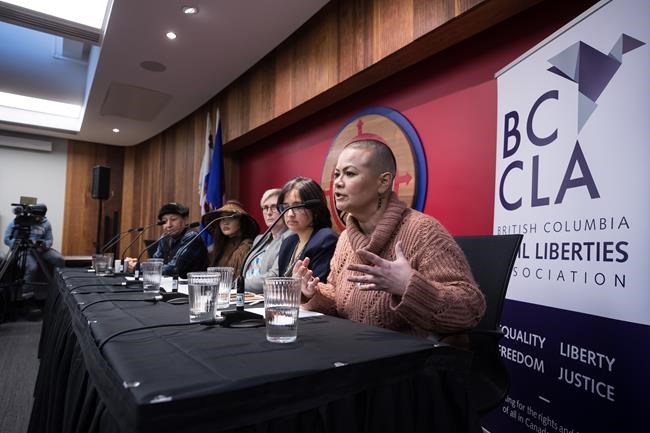An RCMP watchdog is declining to conduct an investigation into complaints against the Mounties for the way they have handled the enforcement of an injunction against Wet’suwet’en protesters and their supporters at the Coastal GasLink blockade near Houston.
But the executive director of the BC Civil Liberties Association, which brought the complaint on behalf protesters, is declaring a victory of sorts, saying a report by the Civilian Review and Complaints Commission (CRCC) validates the concerns raised about RCMP tactics, since some of those tactics were already investigated in a similar complaint seven years ago in New Brunswick.
“The chairperson of the CRCC has decided not to initiate a public interest investigation at this time,” said Harsha Walia, executive director of the BC Civil Liberties Association (BCCLA), which filed the complaint. “But I want to emphasize, not because it is not an issue of significant importance, but on the contrary, the chairperson does not want to delay the matter further by conducting an extensive process at this time because these issues have already been raised with the RCMP.”
The complaint was brought by the BCCLA, Wet’suwet’en hereditary chiefs and the Union of BC Indian Chiefs (UBCIC) on behalf of Molly Wickham, a Wet’suwet’en member who had been part of an occupation of the Morice West Forest Service Road near Houston, B.C. to prevent Coastal GasLink workers from accessing work sites.
Wickham, who had been bringing in food and supplies in January, was prevented by RCMP from getting past a police barricade that had been set up to create an “exclusion zone” for the enforcement of a court injunction.
This was despite the fact the RCMP had posted a press release on its website that stated that people bringing in food, medicine and other supplies would not be prevented from getting into the exclusion zone.
“When I got out there, I was denied access and the police officer who I dealt with couldn’t really give me a good reason as to why,” Wickham said at a press conference Thursday, which was attended by David Suzuki, UBCIC Grand Chief Stewart Phillip, members of the Wet’suwet’en and Mary Ellen Turpel-Lafond, director of the University of BC’s Indian Residential School History and Dialogue Centre.
“He just said that he hadn’t actually read the press release.” Walia described some of the actions of RCMP while enforcing an injunction to be “improper and unlawful.”
While the CRCC commissioner has decided not to conduct an investigation into the RCMP’s handling of protesters at blockades on the Morice West Forest Service Road, she did point to an investigation her office conducted in response to complaints against the RCMP by anti-fracking protesters in New Brunswick seven years ago. Anti-fracking protesters in New Brunswick had brought forward complaints against the RCMP that were similar to the complaints leveled at RCMP in B.C. over the Coastal GasLink protests.
Some of the issues dealt with in that report included things like the RCMP’s use of “over watch,” asking people in exclusion zones for identification, and the use of force in making arrests. That report, called the Kent County Report, had not been made public. However, it was made available to the RCMP a year ago. The CRCC is still waiting for a response to it by RCMP brass.
Though it hasn’t been made public, CRCC commissioner Michelaine Lahaie summarized some of the findings in her response to the more recent complaints filed by the BCCLA. The report made 37 findings and 12 recommendations. The general thrust of Lahaie’s response to the BCCLA is that the RCMP are aware of the concerns and recommendations raised by her in the Kent Report, many of which are similar in nature to the concerns raised by the BCCLA.
“I do not consider it to be in the public interest to commence a public interest investigation into this matter at this time, given the guidance already provided to the RCMP by the Commission on these serious issues,” she writes.
She concludes by saying that she will allow the RCMP to address the complaints leveled by the BCCLA first.
“Once the RCMP's investigation is complete, should you be dissatisfied with its handling of your public complaint, upon your request, the Commission would be able to conduct an independent review of the file.”
Thursday's press conference happened one day after it was announced that RCMP have agreed to dismantle the exclusion zone and withdraw from the area.



